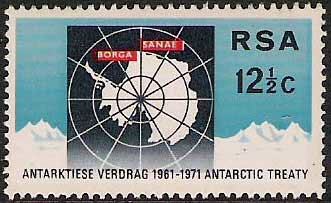 The world learned this week of the sad ending to Antarctic explorer Henry Worsley’s attempt to cross the continent on foot (he died in a hospital in Chile after being airlifted there). That also made me recall a stamp issued in South Africa, commemorating the 1961 Antarctic Treaty (my mom took me to the post office so that I could buy the special first day of issue envelope as well). The Antarctic is a fascinating continent : the only one with no native human population. So what does the treaty say? Here are the articles [Source : Wikipedia].
The world learned this week of the sad ending to Antarctic explorer Henry Worsley’s attempt to cross the continent on foot (he died in a hospital in Chile after being airlifted there). That also made me recall a stamp issued in South Africa, commemorating the 1961 Antarctic Treaty (my mom took me to the post office so that I could buy the special first day of issue envelope as well). The Antarctic is a fascinating continent : the only one with no native human population. So what does the treaty say? Here are the articles [Source : Wikipedia].
Article 1 – The area is to be used for peaceful purposes only; military activity, such as weapons testing, is prohibited but military personnel and equipment may be used for scientific research or any other peaceful purpose;
Article 2 – Freedom of scientific investigations and cooperation shall continue;
Article 3 – Free exchange of information and personnel in cooperation with the United Nations and other international agencies;
Article 4 – The treaty does not recognize, dispute, nor establish territorial sovereignty claims; no new claims shall be asserted while the treaty is in force;
Article 5 – The treaty prohibits nuclear explosions or disposal of radioactive wastes;
Article 6 – Includes under the treaty all land and ice shelves but not the surrounding waters south of 60 degrees 00 minutes south;
Article 7 – Treaty-state observers have free access, including aerial observation, to any area and may inspect all stations, installations, and equipment; advance notice of all activities and of the introduction of military personnel must be given;
Article 8 – Allows for good jurisdiction over observers and scientists by their own states;
Article 9 – Frequent consultative meetings take place among member nations;
Article 10 – All treaty states will discourage activities by any country in Antarctica that are contrary to the treaty;
Article 11 – All disputes to be settled peacefully by the parties concerned or, ultimately, by the International Court of Justice;
Articles 12, 13, 14 – Deal with upholding, interpreting, and amending the treaty among involved nations.
